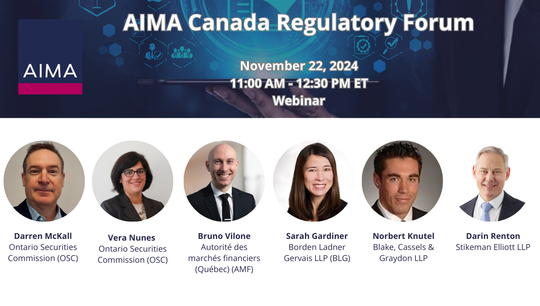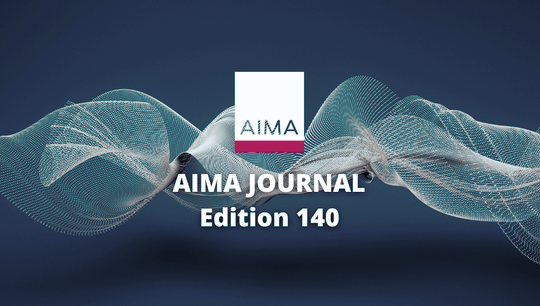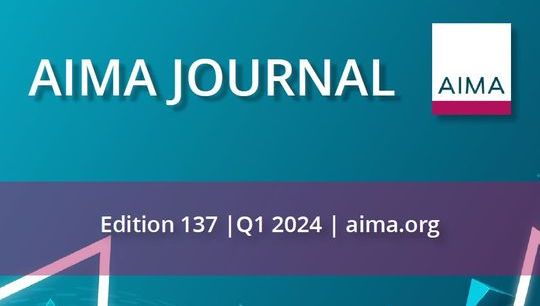Ep. 57 The Long-Short | Unpacking the UK FCA's asset management discussion paper
Published: 22 March 2023
The Long-Short is a podcast by the Alternative Investment Management Association, focusing on the very latest insights on the alternative investment industry.
Each episode will examine topical areas of interest from across the alternative investment universe with news, views and analysis delivered by AIMA’s global team, as well as a host of industry experts.
This week, we speak to regulatory veteran James Hopegood, who after spending 16 years at the Financial Conduct Authority, is now Director of Asset Management Regulation at AIMA. James joins us to unpack the mammoth discussion paper recently published by the UK financial regulator on how the UK can take advantage of Brexit freedoms in the asset management sector.
With his deep knowledge of the regulatory landscape, James provides a whistle-stop tour of what the FCA is trying to achieve, explaining which pieces are most important for AIMA members, and offering a look-ahead at how the process will develop.
Listen to this episode and subscribe on Spotify
Listen to this episode and subscribe on Apple Podcasts
Listen to this episode and subscribe on Google Podcasts
Listen to this episode and subscribe on Amazon Music
Read the transcript
Hosts: Tom Kehoe, AIMA, Drew Nicol, AIMA
Guests: James Hopegood, AIMA
Interlude: Lorna Barnard, AIMA
Tom Kehoe, AIMA 00:06
Welcome to another episode of The Long-Short, I'm your host, Tom Kehoe, with my co-host Drew Nicol.
There are many advantages to working for AIMA and one of those IS having access to individuals who are tasked with helping inform financial market rulemaking around the world and advocate on behalf of our members.
Drew Nicol, AIMA 00:22
Indeed, one of the main reasons we launched this podcast is to share as much of that insider knowledge as we can with a wider audience and to help us all understand what's going on in financial markets a little better, particularly as it pertains to hedge funds and alternative investments.
Tom Kehoe, AIMA 00:38
Here in the UK, the Financial Conduct Authority (FCA) is looking to update regulations for the UK asset management industry, and last month published a discussion paper titled ‘Updating and Improving the UK Regime for Asset Management’, requesting views on the current regime for regulating funds and asset managers regarding the FCAs initial ideas for the future regulatory framework review.
Drew Nicol, AIMA 00:58
The discussion paper has no fewer than 24 questions that set out some high-level areas that it wants to address, including meeting the needs of both retail and professional investors, enabling technological development and innovation, consistency with international standards, and being effective and appropriate. The scope of this review is simply vast, and so we have recruited some help from AIMA’s government and regulatory affairs team to help guide us through the essential points that we and you the listener should know.
Tom Kehoe, AIMA 01:28
James Hopegood joined AIMA in September last year, having worked for the FCA for the previous 16 years and he was indeed the FCA’s representative on the International Organisation of Securities Commission’s Committee 5 on investment management and before that he was seconded from the FCA to the Asset Management Unit of the European Commission. He was also part of the team that developed the FCA’s overseas funds raising regime, so he really is the perfect guest for today's episode. James, you're very welcome to The Long-Short.
James Hopegood, AIMA 01:56
Thank you very much, Tom and Drew. I'm very pleased to be here. And I hope I'll be able to draw at least part of the curtain away so you can get a better view of what it is this DP (Discussion Paper) is actually about and what we want to achieve from it.
Tom Kehoe, AIMA 02:10
Thank you. So, we mentioned the high-level themes of this discussion paper, but can you expand them on what the FCA is looking at regarding feedback on this paper?
James Hopegood, AIMA 02:22
As you said, the DP asks a lot of questions, a total of 24. It's on a wide range of issues that are set out in 12 main sections. A lot of these questions relate to retail funds. So, less of a concern to us. But there are a lot of issues here that relate specifically to professional funds, as well as questions about the use of international standards going forward. So, what the FCA has set out here is a shopping list of issues, and it's the start of what is the very long-awaited conversation on what exactly the post-Brexit landscape for asset management is going to look like.
An important thing to note in talking about the DP is that I think the FCA appears to be genuine in wanting to have a really wide-ranging and thorough discussion about all the issues. But whatever it does, it will be thinking about its three key operational objectives. And these are the things that set out its legal requirements, and it's what I've lived and breathed when I worked at the FCA.
So, the first one is consumer protection. Whatever is put forward needs to understand that they are going to be thinking first and foremost about this, particularly in the retail space. So again, it may be not quite as much of an issue for us, but it will still be something we need to think about. They also must ensure the ongoing integrity of markets. So, what happens mustn't disrupt the market or create financial stability risks. And the third one, which is unique to the FCA at the moment, is that competition has to work in favour of the consumer. So effectively, anything that looks like an anti-competitive measure would have to be justified incredibly strongly in order to do it.
So, bearing that in mind, the FCA wants to think about how can it make use of Brexit freedoms to at the very least streamline what we have at the moment in the FCA handbook. And probably at best make what could be some quite far-reaching thoroughgoing reforms to parts of the handbook where we think that we can do things that are better and appropriate and proportionate to the way in which our industry works. So, this all works within the framework, as you mentioned the future regulatory framework, which is going to move lots of the rules that were transposed from Europe straight into UK primary legislation, it's going to move a lot of those into both the FCA and the PRA (Prudential Regulatory Authorities) handbooks because quite frankly, there are too many rules in there for parliamentarians to be able to look after and update. So, that's the wider context to it.
Drew Nicol, AIMA 05:26
And what you've hinted out there is that there is an overlaying political angle to this when you talk about Brexit and a post-Brexit environment, and you've mentioned some of the guardrails that the FCA is working in as part of this discussion. What does success look like for them? And what are they really trying to get out of this?
James Hopegood, AIMA 05:47
Well, the FCA has quite a long shopping list. It comprises a whole range of issues that either they want to talk about, or very important stakeholders, both internationally and nationally want to talk about, so they're going to have to balance a range of issues here. So, for example, the UK Government has a clear aim to maintain and hopefully enhance the UK as one of the world's premier asset management hubs. At the same time, we have organisations like the Financial Stability Board that are worrying about what they see as potential risks to the financial system that open-ended funds could create. And so, there's a section in the DP that discusses this issue.
There's also the whole question of divergence with Brexit. And how far can we go there? The FCA appears to be keen to talk about this. But I think we can be pretty clear that there'll be some red lines, one of which will not be upsetting the current system of delegation as it works. I think everyone's aware that the UK manages an enormous amount of money on behalf of European funds, both retail and institutional. And the government does not wish to see that upset, particularly as the negotiations that are reviewing the Alternative Investment Fund Managers Directive (AiFMD) seem to be coming out in a place that we're happy with in relation to the current system of global delegation not being disrupted. So, I think that's quite important.
But within that, the DP talks about international standards, rather than European standards. And my educated guess there would be that what they're thinking about is saying, we don't have to conform, have our rule books looking exactly the same. We can say, we think this rule can be changed a bit to make it better, or we could get rid of it because it's encompassed by something somewhere else. The issue is that the FCA would say that it conforms and is entirely consistent with all international standards, particularly those set by Iosco, which is the International Organisation of Securities Commissions. on that basis. And obviously, the European Union also conforms to all of those standards, they're looking at achieving particular outcomes. So, what the FCA would presumably be able to argue is that it doesn't matter that our handbooks are not exactly the same. The issue here is that we are still achieving the same outcomes in relation to consumer protection in relation to the integrity of markets, for example. So, I think that's, that's an overlay there, that's quite interesting.
You also have the other issue, which is that we can all reel off a list of issues where the AiFMD and MiFID (Markets in Financial Instruments Directive) aren't that helpful in places. However, we've also got quite a lot of sunk costs in there, everyone's paid a lot of money and trained a lot of people in order to be able to meet these requirements. There is always a question about, okay, we could have something new and different and better, but it has to be really better in order to justify what could be the potential cost and disruption to the industry.
Tom Kehoe, AIMA 09:05
And, James, the first thing that AIMA does when we see one of these papers or a consultation that we want to respond to, is to start to canvass the views of our members. And so, with that being said, what are the issues that you see are most relevant to our members?
James Hopegood, AIMA 09:24
Yes, we do. We have already started working on this and we've had an initial call with some of our members to take the temperature on what they would like to see. I think one of the big-ticket items that everyone's going to be interested in is one of the first sections that the discussion paper looks at, which is, what are the opportunities for, in some way, streamlining, or merging the handbook which is currently based on three key pieces of EU legislation, AiFMD, MiFID, and the UCITS (Undertakings for the Collective Investment in Transferable Securities) directive, which sets up the retail side effectively.
These directives are all worded slightly differently. They cover different yet often overlapping areas. They can be contradictory. I mean, the FCA calls that out in the discussion paper very well, I think, when it talks about the slightly different requirements in relation, for example, things like conflicts of interest. And it is a bit odd, to say the least, that conflicts of interest are thought to be managed in different ways for the same thing in a range of pieces of legislation. So, there is the opportunity there to put forward either quite far-reaching ideas, and some members are attracted to the idea that well, maybe we should be thinking about, where is the business that they're doing. And it's the rest of the world and particularly the US. So are there, for example, any opportunities to think about being more aligned with US rules, particularly the rules from the US Securities and Exchange Commission, and what we nerds know is Form PF, which is effectively their version of reporting and what the AiFMD requires for them.
So, we could be looking at the rest of the world for inspiration, but I go back to that there are a lot of sunk costs. There's obviously quite a lot of opportunity for a lot of technical tinkering, and getting rid of some of the annoying overlaps or the pointless bits of rules, like the requirements about so-called vulture funds that found their way into the first AiFMD because of what was in fact, German sensibilities about companies being taken over by some private equity groups. But, a lot of the reporting there is proved to be completely meaningless. So, we could say goodbye to that.
I think there are issues in the DP that we have to be quite careful about, as well. So, for example, I've mentioned already that the DP reflects a push from the Financial Stability Board in relation to open-ended funds and financial stability risks. And this has translated into more requests for reporting. Well, do they need it? More to the point is it actually reported somewhere else already, and shouldn't they be asking from them, particularly from banks? But also, they want to see greater use of liquidity risk management tools. So, I'm thinking here about anti-dilution tools like swing pricing, or the use of side pockets. AIMA has always supported the use of such tools and we are keen that managers have the widest range of appropriate tools available to them. However, the FSBs concerns really focus on daily dealing funds, so UCITS funds in the UK and the EU, and like the 1940 Act funds in the US that invest in assets, like corporate bonds, or emerging market equities that can at the flip of a switch suddenly become illiquid. And so, it makes it hard for them to meet redemption requests on a daily basis, which leads to a fire sale, which then can lead to instability in the prices, which then affects the wider financial system. Well, I mean, the evidence there is not as clear-cut as the FSB would like to have a sting.
But also, it tends not to understand the fact that our members are not running daily dealing funds. They're not investing in equities and bonds in that way. There are alternative investment managers running alternative funds, which have rules that relate to ensuring that the assets you invest in reflect the redemption terms in the fund. They're often not daily dealing, they can be very infrequent in their dealing. So, if there's going to be anything, it needs to really take account of the fact that alternative funds do not behave like return authorised funds, and they're not supposed to. We have professional investors who should understand the risk, should have done their due diligence, and will be comfortable with different types of redemption terms and investing in illiquid assets.
I think that brings me to another point, a more general point, what's important here is that protections that might be appropriate in the retail space, do not, in some way bleed, over into the professional space. One of the things that the initial call with members brought up was the wish to have a really clear demarcation between the retail and the professional spaces, which would allow regulation to better reflect the types of funds and the types of clients that they invest in. I think that's going to be one of the important points for us to make sure that the client types that alternative managers are investing on behalf of, are properly taken into account, and the needs of the investors are properly understood.
Lorna Barnard, AIMA 15:16
Interlude - AIMA’s Next Generation Manager Forum, now in its 10th year, returns to London on Tuesday the 16th of May. The forum provides a platform for the exchange of ideas and the development of peer networking for senior individuals at alternative asset management businesses managing up to US$500 million in hedge and private credit assets. Throughout the afternoon, speakers will discuss next-generation managers 10 years on, the war for talent, how to acquire and keep it, ESG implementation and non-negotiables, and investor relations, retention and maintenance. Register today to learn more from the stellar speaker lineup and engage and network with colleagues, both old and new. We look forward to welcoming you.
Drew Nicol, AIMA 15:58
So, we've got a bit of a sense of what our members are most interested in. Moving this forward, how will AIMA be looking to get itself involved in these conversations and help our members?
James Hopegood, AIMA 16:12
Well, as I said, we've already started working on this, we've set up the UK funds proposal working group, it's not a closed group, it is open to all members to contribute to or join. And if you don't have the resources to be an active member, we still would like to hear what your concerns are, and where the areas are that you want to talk about. And so, we're doing this work, we're developing this work, we will be talking to other stakeholders as we go forward. And then we'll be providing updates on it.
I think one of the things that we need to do at the start, and I think it's quite an important point, is that we need to prioritise what it is that we want to get out of this. There's a range of issues in the DP, 12 in all, some of which relate to professional funds, and we also have the opportunity to add other things. Question 24 basically says, ‘is there anything we haven't mentioned that's relevant?’ So, we can have a great long list of big-ticket and technical issues to deal with, but we’re probably going to get more traction if we focus this more on the things that really matter to us. What is it that we want to see happen? And what is the evidence that will support our arguments for that?
It's also not just about what's important, but also thinking about the timetable. So, for example, something can be quite easily fixed, you could do a search for conflicting terms through the FCA handbook and you could amend those. You could switch off bits of reporting that aren't necessary, very easily. But other things will require more time, and they'll probably require quite a lot of technical input in a consultation process. So, we need to think about both what's strategically and tactically important, but also, what can be done quickly, and what has to be done over a longer timeframe. This is to make sure that the FCA understands why our priorities are those priorities, with good evidence-based arguments to back them up.
As I say, I think the FCA is genuine about wanting to have a proper thoroughgoing debate about this because it's framed its discussion paper in quite a high-level way, which is slightly frustrating in one way, because you think, well, what can I bite, but at the same time, what they're not doing is directing the argument in a really, really clear and obvious way and the way in which they would with the consultation paper without actually proposing to do something. Here they're asking, not quite ‘what should we do?’ But instead of saying, ‘these are the areas we think we could do something with, what do you think about that? And is there anything else that we should be thinking about?’
Tom Kehoe, AIMA 19:11
James, you've been down this road many times, I'm sure, what are the next steps regarding the consultation?
James Hopegood, AIMA 19:19
So, what we have at the moment says is the discussion paper where the responses are due by the 22nd of May. It’s a good, generous period of time. And during that time, we have our internal cuisine, and then we have the FCA's internal cuisine. So, our internal cooking was going to be working out what we've just been talking about, prioritising things. We also have a list of issues that relate to both AiFMD and MiFID that we've put to the FCA before, and issues we'd like to see changed. One of the things we'll be doing is we'll be revisiting those issues to see how they map into this and including those, again where it's appropriate. If there isn't a question that maps to it, we will still ask it because they've asked us to give them information about things that they haven't covered.
Then, having got that to the FCA, the FCA then will have probably quite a mammoth task in terms of collating all of the responses, and then formulating a response to them. From experience, there is a chance that we could have a feedback statement by just before the summer break, but a chance, it depends on just how controversial or how difficult the issues are. I think what you will often find is, after a discussion paper comes out, you then move into deciding what to focus on, and the FCA will then start to make proposals in a consultation paper. So, what you'll probably have is a feedback statement and consultation paper in one, to start with. That will be published and it will be what's called a ‘three-star consultation’ because it's very important. So, it will have at least three months consultation period, so, we're now looking at autumn. Then you'll have further feedback and policy statement, which will say these are the responses that we've made that we've received to our proposals, this is what we think about them, these are the areas where we're going to say this is going to become a rule, and then all the other areas, I suspect, because this is going to be quite iterative, where they say when we're going to have further consultation.
So, it wouldn't be a surprise to see two or three different consultation papers running, it would be a fairly intuitive thing to guess that they might have one that specifically relates to UCITS-type issues in the retail space. There's obviously an opportunity for something in the professional space to look at both the professional regime and also reporting issues that in some cases might not be as relevant to the retail side. So, I think you could have a couple of deep consultation papers like that, and one that's cross-cutting. So, it rather depends on just how much feedback there is.
One of the issues that we might want to push a little bit here is regarding one of the concerns that the FCA has put out into the discussion paper. That is the concern that depositories on the retail side are not fulfilling their oversight duties in the way in which the FCA is completely happy with. So, when it comes to the FCA proposal or questions about depositories, the question would be is this something we need new rules on? Or is it something where perhaps the FCA could make depositories compliance or higher supervisory priority, for example. Similarly, with due diligence, not sure we need rules on due diligence. This is an issue for the fund manager to ensure that they fully understand what it is. I mean, the FCA is concerned again, I think this is aimed at the retail space, that it's not taking credit issues as properly and as thoroughly into account as it would like. Well, that's fine, but in the alternative space, due diligence, investment due diligence is one of the gods of war. And it's something that our members spend a great deal of time and money doing. We have our due diligence questionnaires, we do a great deal of work here. So, query A) does the FCA actually need to do this? Or, B) does it need to challenge firms more? If it (the FCA) is going to do something, well, it really shouldn't go any further than what's already sitting in AiFMD, which has proved to be entirely appropriate On the professional side.
Drew Nicol, AIMA 24:03
James, forgive the impossible question here. But just for a layman such as myself, what do you see as the most likely outcome, just briefly in the sense of at this very early stage, if you had to guess?
James Hopegood, AIMA 24:18
I think there's likely to be two outcomes going forward looking at what we've got. Either, it's just tinkering at the edges. There's a fear of going too far. There's a lack of political will. There's concern about disrupting existing models. And so, it turns into an exercise where the FCA gets to fix all the bits of the rulebook that it’s been wanting to fix for quite a while but hasn't had time to and makes a few what seem like possibly thoroughgoing but in the end are quite modest changes in relation to the relationship between MiFID and AiFMD, or something like that.
Or, they could do something genuinely far-reaching, which would require a political consensus and a political will, not just within the FCA but also within the central government. Thinking about things like, can we align more towards the US model bearing in mind where the business sits? As we know, 50% of our members' assets are in the US. So, that's a compelling argument for us as well to at least think about things. So, I think it's, it's either going to be a really big bang or a very damp squib. I'm not sure. But, we'll have to see how this all pans out, we'll have to see what happens because this whole process will take place in the run-up to a general election. And so, we don't know who the new government will be, and what their appetite is for this kind of change.
So, a lot of variables. Perhaps I'm being a little bit too binary at the moment in thinking it could be one way or the other. We shall see, we shall see. I'm afraid my crystal ball is a little bit grubby right now.
Tom Kehoe, AIMA 26:26
And we'll have to get you back on James to give us an update and give our listeners an update on the developments regarding this. In the meantime, I gather AIMA has a working group which will discuss these issues. Is it seeking to expand this group? What details can we share with our listeners on that, James?
James Hopegood, AIMA 26:47
We would be very pleased to expand our group, we've just set it up and we're very keen that as many of our members as possible contribute to this. The more information we have, and not just in terms of suggestions, but also the underlying data and evidence, the richer our submission will be and the more compelling it will be for the FCA to understand it.
So, I understand that a lot of this can seem quite dry. And, perhaps trigger an attitude of well ‘what's that got to do with me, I'm running a business’. But it is going to have an effect on businesses going forward, one way or another. It could be beneficial, we could be really pleased with what comes out of it. Or, we could find ourselves having to fight against some proposals that we really don't like, probably the most important thing for us to do is to make the argument first. Get in there with a really strong compelling argument. So, the more people who either are simply happy to feed in some thoughts or would actually want to be actively engaged in the working group, the better. We don't have a ceiling on the number of members in our minds, what we want is as much engagement as our members are practically able to give us, to take as much of their views into account and get it as right as we possibly can to aid their businesses to function and function well and hopefully better in the future.
Tom Kehoe, AIMA 28:21
That's all we have for today. James, many thanks for joining us on The Long-Short and no doubt we'll check in with you again in the near future.
James Hopegood, AIMA 28:34
My absolute pleasure.
Disclaimer
This podcast is the sole property of the Alternative Investment Management Association (AIMA). This audio production and content are intended as indicative guidance only and are not to be taken or treated as a substitute for specific advice, whether legal advice or otherwise. AIMA permits use or sharing of the content in media or as an educational resource, provided always that proper attribution is made. The rights in the content and production, including copyright and database rights, belong to AIMA.







